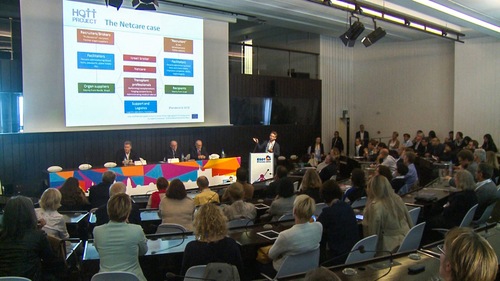Special Forum on Organ Trafficking at European Society for Organ Transplantation Congress
(Minghui.org) A special forum on organ trafficking was held at the 17th Congress of the European Society for Organ Transplantation (ESOT) in Brussels, Belgium, September 13 to 16, 2015. The practice of illegal organ transplants in China captured the attention of the forum participants.
More than 3000 people attended. Doctors Against Forced Organ Harvesting (DAFOH) was invited to attend. DAFOH conducts investigations about China's live organ harvesting from prisoners of conscience, especially Falun Gong practitioners.
 Venue for the 17th Congress of ESOT in Brussels, Belgium.
Venue for the 17th Congress of ESOT in Brussels, Belgium. Forum on organ trafficking
Forum on organ trafficking
Many medical professionals and representatives of the legal profession attended the forum on organ trafficking. Prof. John Forsythe, ESOT President, was the forum moderator. Convinced of the importance of this issue, he paid it special attention.
Interviewed by the media afterward, Prof. Forsythe said that the room was filled to capacity and there was much discussion on the topic, which all agreed must be solved. He indicated that organ trafficking raises concerns for all involved in organ transplantation. Concerning organ trafficking in China, the transplantation community has taken some measures to deal with it.
Canadian lawyer David Matas, an independent investigator of the Chinese Communist Party (CCP)'s live organ harvesting, attended the congress. He said that transplant professionals might see their work as beneficial, but they cannot begin to imagine how technology is being used in China to kill prisoners of conscience on demand for their organs. He said at the forum that transplant abuse in China is a big issue and that the international community must take action to stop it.
 Harold King (on left), representative of DAFOH, in his booth at the congress.
Harold King (on left), representative of DAFOH, in his booth at the congress.
Harold King, who was at the congress representing DAFOH, said that, for 16 years, the CCP regime has been trafficking in organs taken from prisoners of conscience without their consent. DAFOH wants to inform the medical community about this crime in China and stop it.
Many visited the DAFOH display. Doctor King said that, although quite a few doctors had already heard about the CCP's practice of live organ harvesting, those who hadn't were moved to tears to learn the gruesome details. Others were misled by the CCP's propaganda and thought that it had already been stopped.
Prof. Forsythe indicated that he has known about China's organ trafficking for several years and that just condemning it will not stop it. In his opinion, legal professionals should work with the medical profession to solve the issue.
Matas pointed out that the CCP regime tells people what they want to hear, such as promising to phase out organ harvesting from prisoners of conscience. But, in fact, the problem still exists.
He said there is no transparency, so it is hard to trace the source of organs. In addition, the CCP regime declines to provide the number of death-row inmates and any organ registration data. He said it would be more effective to simply stop cooperating with Chinese doctors and that such a measure would have an impact in China.